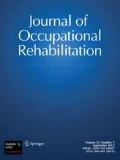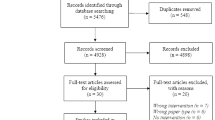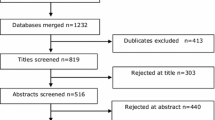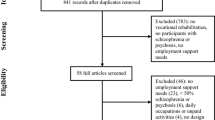Abstract
Purpose Disability discrimination legislation means that employees with a disability or mental illness are legally entitled to reasonable workplace accommodations that enable them to work effectively and safely. This scoping review aims to investigate the types of workplace accommodations provided for people with mental illness, and their costs and benefits. Methods A literature search was conducted using five electronic databases. Peer reviewed research articles published between 1993 and June 2013 were included in this scoping review and their quality was assessed. Opinion papers, reports, and case descriptions were excluded. Results Nine studies explored workplace accommodations for people with mental illness. The most commonly reported work-related accommodations were flexible scheduling/reduced hours, modified training and supervision, and modified job duties/descriptions. The least common type of accommodation was physical modification to the workplace. For employees with persistent mental illness who were accessing a supported employment agency, the majority of accommodations related to support from the job coach or employment specialist, such as facilitating communication with the employer during hiring or on the job. The quality of the studies varied considerably and the benefits of the accommodations are not yet well documented. There is limited evidence that a larger number of workplace accommodations are associated with longer job tenure. Conclusions Workplace accommodations appear to be important to support employees with mental illness, but more accessible information about how disability discrimination legislation applies to this population is needed. Future research should address the implementation and effectiveness of mental health-related workplace accommodations.
Similar content being viewed by others
References
Corbière M, Zaniboni S, Lecomte T, Bond G, Gilles PY, Lesage A, et al. Job acquisition for people with severe mental illness enrolled in supported employment programs: a theoretically grounded empirical study. J Occup Rehabil. 2011;21(3):342–54. doi:10.1007/s10926-011-9315-3.
Henry AD, Lucca AM. Contextual factors and participation in employment for people with serious mental illness. OTJR Occup Partic Health. 2002;22:83S.
Drake RE, Bond GR, Thornicroft G, Knapp M, Goldman HH. Mental health disability: an international perspective. J Disabil Policy Stud. 2012;23(2):110–20. doi:10.1177/1044207311427403.
Waghorn G, Saha S, Harvey C, Morgan VA, Waterreus A, Bush R, et al. ‘Earning and learning’ in those with psychiatric disorders: the second Australian national survey of psychosis. Aust NZ J Psychiatr. 2012;46(8):774–85.
Secker J, Membrey H. Promoting mental health through employment and developing healthy workplaces: the potential of natural supports at work. Health Educ Res. 2003;18(2):207–15.
Mak DCS, Tsang HWH, Cheung LCC. Job termination among individuals with severe mental illness participating in a supported employment program. Psychiatr Interpers Biol Process. 2006;69(3):239–48.
Becker DR, Drake RE, Bond GR, Xie H, Dain BJ, Harrison K. Job terminations among persons with severe mental illness participating in supported employment. Community Ment Health J. 1998;34(1):71–82.
Wang J, Patten S, Currie S, Sareen J, Schmitz N. Perceived needs for and use of workplace accommodations by individuals with a depressive and/or anxiety disorder. J Occup Environ Med. 2011;53(11):1268–72.
MacDonald-Wilson KL, Rogers SE, Massaro JD, Lyass MS, Crean T. An investigation of reasonable workplace accommodations for people with psychiatric disabilities: quantitative findings from a multi-site study. Community Ment Health J. 2002;38(1):35–50.
Secker J, Membrey H, Grove B, Seebohm P. The how and why of workplace adjustments. Psychiatr Rehabil J. 2003;27(1):3–9.
McAlpine DD, Warner L. Barriers to employment among persons with mental illness: a review of the literature. New Brunswick: Rutgers University; 2002.
Unger D, Kregel J. Employers’ knowledge and utilization of accommodations. Work. 2003;21(1):5–14.
Mancuso L. Reasonable accommodation for workers with psychiatric disabilities. Psychosoc Rehabil J. 1990;14(2):3–9.
Mizzoni C, Kirsh B. Employer perspectives on supervising individuals with mental health problems. Can J Community Ment Health. 2006;25(2):193–206.
Banks B, Charleston S, Grossi T, Mank D. Workplace supports, job performance, and integration outcomes for people with psychiatric disabilities. Psychiatr Rehabil J. 2001;24(4):389–96.
Grant MJ, Booth A. A typology of reviews: an analysis of 14 review types and associated methodologies. Health Inf Libr J. 2009;26(2):91–108. doi:10.1111/j.1471-1842.2009.00848.x.
Saunders SL, Nedelec B. What work means to people with work disability: a scoping review. J Occup Rehabil. 2013;1–11. doi:10.1007/s10926-013-9436-y.
Letts L, Wilkins S, Law M, Stewart D, Bosch J, Westmorland M. Critical review form—qualitative studies (version 2.0). Hamilton: McMaster University; 2007.
Thomas BH, Ciliska D, Dobbins M, Micucci S. A process for systematically reviewing the literature: providing the research evidence for public health nursing interventions. Worldviews Evid Based Nurs. 2004;1(3):176–84.
Curtin M, Fossey E. Appraising the trustworthiness of qualitative studies: guidelines for occupational therapists. Aust Occup Ther J. 2007;54:88–94.
Wåhlin C, Ekberg K, Persson J, Bernfort L, Öberg B. Evaluation of self-reported work ability and usefulness of interventions among sick-listed patients. J Occup Rehabil. 2013;23(1):32–43. doi:10.1007/s10926-012-9376-y.
De Rijk A, Nijhuis F, Alexanderson K. Gender differences in work modifications and changed job characteristics during the return-to-work process: a prospective cohort study. J Occup Rehabil. 2009;19(2):185–93. doi:10.1007/s10926-009-9168-1.
Fabian ES, Waterworth A, Ripke B. Reasonable accommodations for workers with serious mental illness: Type, frequency, and associated outcomes. Psychosoc Rehabil J. 1993;17(2):163–72.
Granger B, Baron R, Robinson S. Findings from a national survey of job coaches and job developers about job accommodations arranged between employers and people with psychiatric disabilities. J Vocat Rehabil. 1997;9(3):235–51.
Granger B. The role of psychiatric rehabilitation practitioners in assisting people in understanding how to best assert their ADA rights and arrange job accommodations. Psychiatr Rehabil J. 2000;23(3):215–23.
Zwerling C, Whitten PS, Sprince NL, Davis CS, Wallace RB, Blanck P, et al. Workplace accommodations for people with disabilities: National Health Interview Survey Disability Supplement, 1994–1995. J Occup Environ Med. 2003;45(5):517–25.
MacDonald-Wilson KL, Rogers ES, Massaro J. Identifying relationships between functional limitations, job accommodations, and demographic characteristics of persons with psychiatric disabilities. J Vocat Rehabil. 2003;18(1):15–24.
King J, Cleary C, Harris MG, Lloyd C, Waghorn G. Employment-related information for clients receiving mental health services and clinicians. Work. 2011;39(3):291–303.
Gewurtz R, Kirsh B. Disruption, disbelief and resistance: a meta-synthesis of disability in the workplace. Work. 2009;34(1):33–44. doi:10.3233/WOR-2009-0900.
Schartz HA, Hendricks DJ, Blanck P. Workplace accommodations: evidence based outcomes. Work. 2006;27(4):345–54.
Walls RT, Hendricks DJ, Dowler DL, Hirsh AE, Orslene LE, Fullmer CL. Job accommodation resources: lessons from the global neighborhood. J Rehabil. 2002;68(4):34–9.
Employment Assistance Fund. Australian Government. 2013. http://jobaccess.gov.au/content/employment-assistance-fund. Accessed June 16 2013.
Author information
Authors and Affiliations
Corresponding author
Appendix
Rights and permissions
About this article
Cite this article
McDowell, C., Fossey, E. Workplace Accommodations for People with Mental Illness: A Scoping Review. J Occup Rehabil 25, 197–206 (2015). https://doi.org/10.1007/s10926-014-9512-y
Published:
Issue Date:
DOI: https://doi.org/10.1007/s10926-014-9512-y




